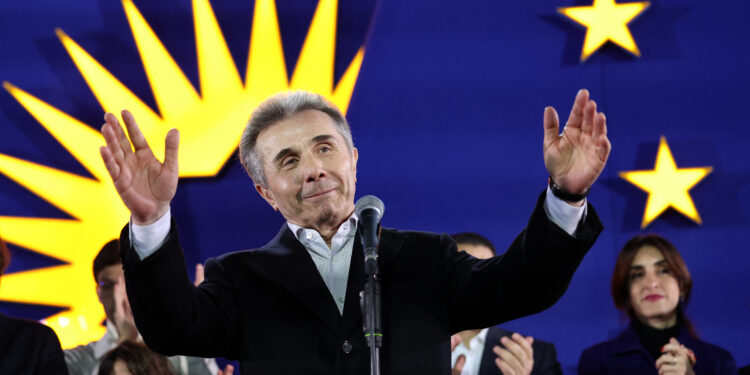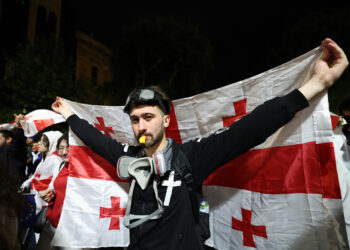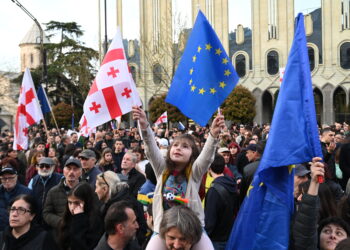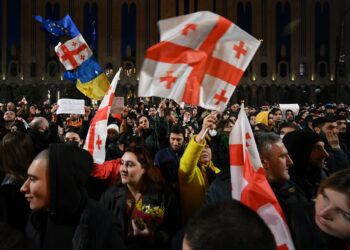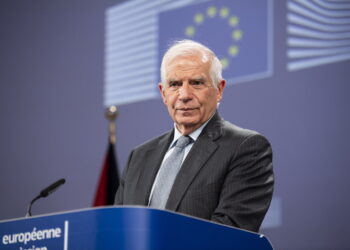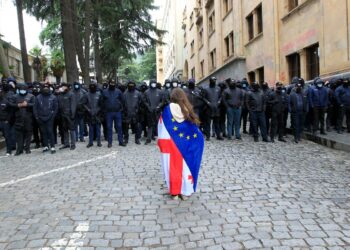Brussels–Saturday’s (Oct. 26) elections may have complicated even more the already problematic situation in Georgia. Amid severe and widespread election irregularities, the ruling party, Georgia Dream, claimed a clear victory (with over 50 percent of the vote) over the opposition, who, however, contested the result and, under the leadership of the President of the Republic, called on citizens to take to the streets against the usurpation of the European future of the Caucasian country, whose status as a candidate for EU membership has been blocked for months. And which is now most likely heading for a new phase of instability and, perhaps, renewed tensions and violence.
The results of the polls
As was the case with the pre-election polls, the exit polls circulated immediately after the end of voting in Georgia yielded very different results depending on the entity that commissioned them and its proximity to government or opposition forces, contributing to a climate of polarization in which each of the two factions is convinced to have won.
According to the official data provided by the National Electoral Commission, with almost all (99.97 percent) of the votes counted, the ruling Georgian Dream party won an absolute majority, at 53.93 percent, thus securing 41 seats out of the total 150 in the single-chamber parliament (still registering a substantial drop from the current 74). In urban centers (including the capital, Tbilisi), it fared worse, even remaining below 40 percent, while in rural and peripheral areas, it touched plebiscite percentages that, in some cases, approached 90 percent. In reality, the seats that Premier Irakli Kobakhidze‘s party is expected to win are even more because the votes of electoral lists that failed to pass the 5 percent threshold (a dozen political formations that collectively won just under 11 percent of the vote) will have to be redistributed.
The Opposition Forces that passed the bar (which did not unite in a single coalition but presented themselves in four separate lists) stopped at a total of 37.77 percent: Coalition for Change took 11.03 percent, United National Movement 10.17 percent, Strong Georgia 8.81 percent, and For Georgia 7.77 percent.
Fraud and irregularities in voting
However, the official results do not seem trustworthy. According to all election observers, both international and local, Saturday’s vote was heavily affected by significant irregularities and systematic fraud in virtually every electoral district in the country. The preliminary report of the international observer mission led by the Office for Democratic Institutions and Human Rights (ODIHR) of the Organization for Security and Cooperation in Europe (OECD) speaks of “a tense environment, with frequent compromises in vote secrecy and several procedural inconsistencies, as well as reports of intimidation and pressure on voters that negatively impacted public trust in the process.”
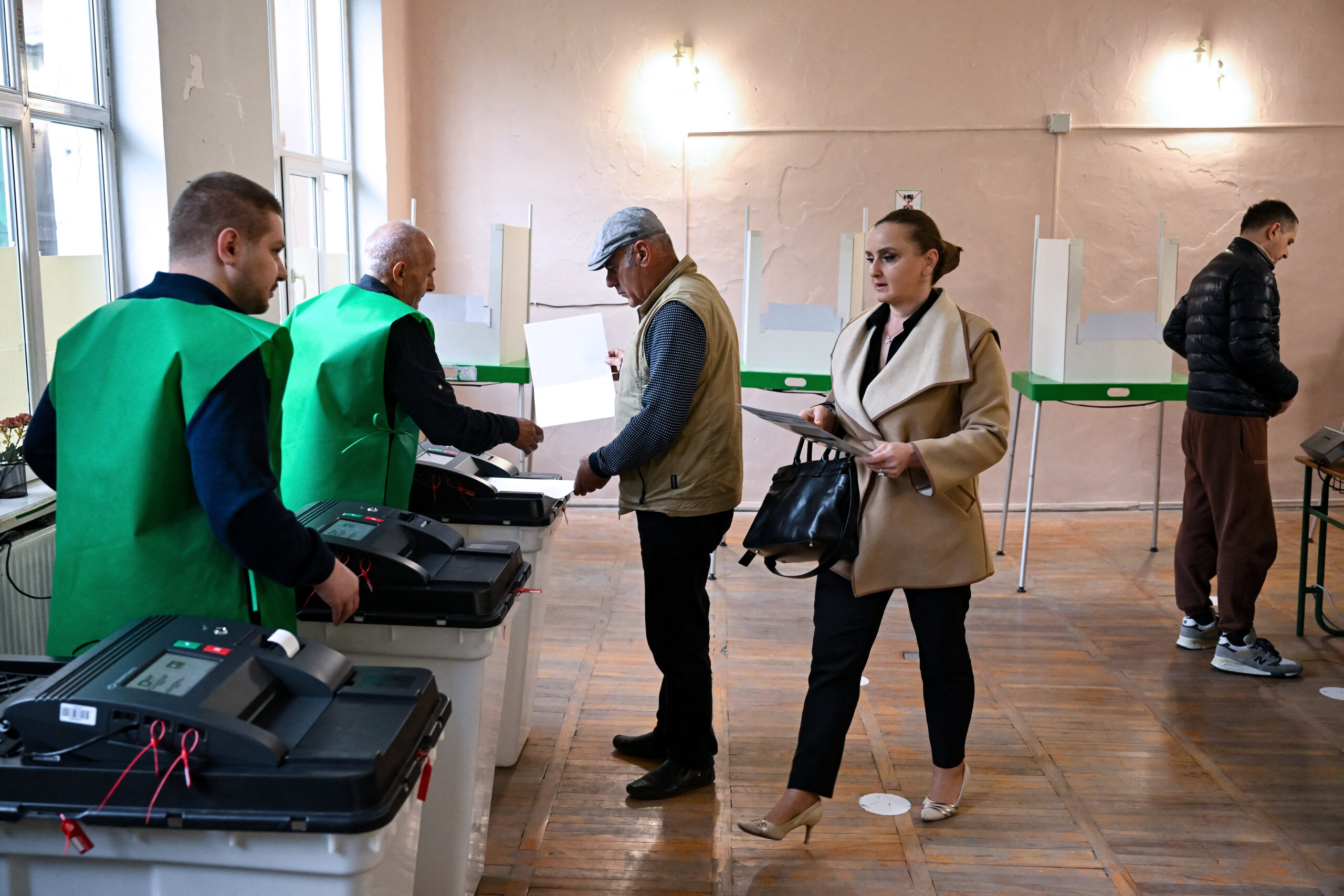
In addition to intimidation–physical and verbal–there were other forms of pressure from state bodies now captured by Georgian Dream, which have used their administrative capacity to threaten public sector employees, especially in rural and remote areas. “This, coupled with the extensive tracking of voters on election day,” the report says, “has raised concerns about the ability of some voters to cast their votes without fear of retribution.”
A Western observer who monitored voting in the southern district of Marneuli, 30 kilometers south of the capital, confirmed to Eunews anonymously (given the sensitivity of the information disclosed) that a long series of violations had occurred. He spoke of episodes of violence both outside and inside the polling stations, in which unidentified individuals were often involved, against both voters and independent observers who were trying to ensure the integrity of the vote (like the one recorded by the Studio Monitor organization). Some clashes also occurred between independent observers and those aligned with the government, who were described as “very aggressive” and “did their best to prevent independent observers from verifying” the regularity of the process.
The following were among the most frequent irregularities reported: violation of the voting secrecy, forced insertion of pre-filled cards into the ballot box, multiple votes with the same ID, votes cast with invalid IDs or with other people’s IDs, insults, threats, and assaults on observers (several were forced to leave monitoring sites) and voters (some were even attacked with pepper spray inside polling stations). Many violations were documented and disseminated online.
“At the polling station where I am, unknown individuals are handing out passes of other people to groups of voters they have brought with them only to vote,” the observer explained to Eunews. At other polling stations, “creepy men” had “lists of voters’ names and did not answer any questions.” “Some people were beaten for complaining” about irregularities, our source added, including an opposition politician who was “viciously beaten” at a polling station in the capital.
Opposition protest
All parliamentary opposition forces have contested the elections, calling them “stolen” by the government, and announced that they do not intend to install their elected officials in the hemicycle. The president of the republic, pro-European Salomé Zourabichvili, has publicly called “illegitimate” Saturday’s vote, and argued that it was pro-EU forces, and not the Georgian Dream that emerged victorious from the polls. “This was a total fraud, a total elimination of your votes,” she said during a press conference Sunday (Oct. 27). “This has never happened before,” she continued, claiming that it was “a Russian intelligence operation” and that Georgian citizens were “deprived of the right to choose.”
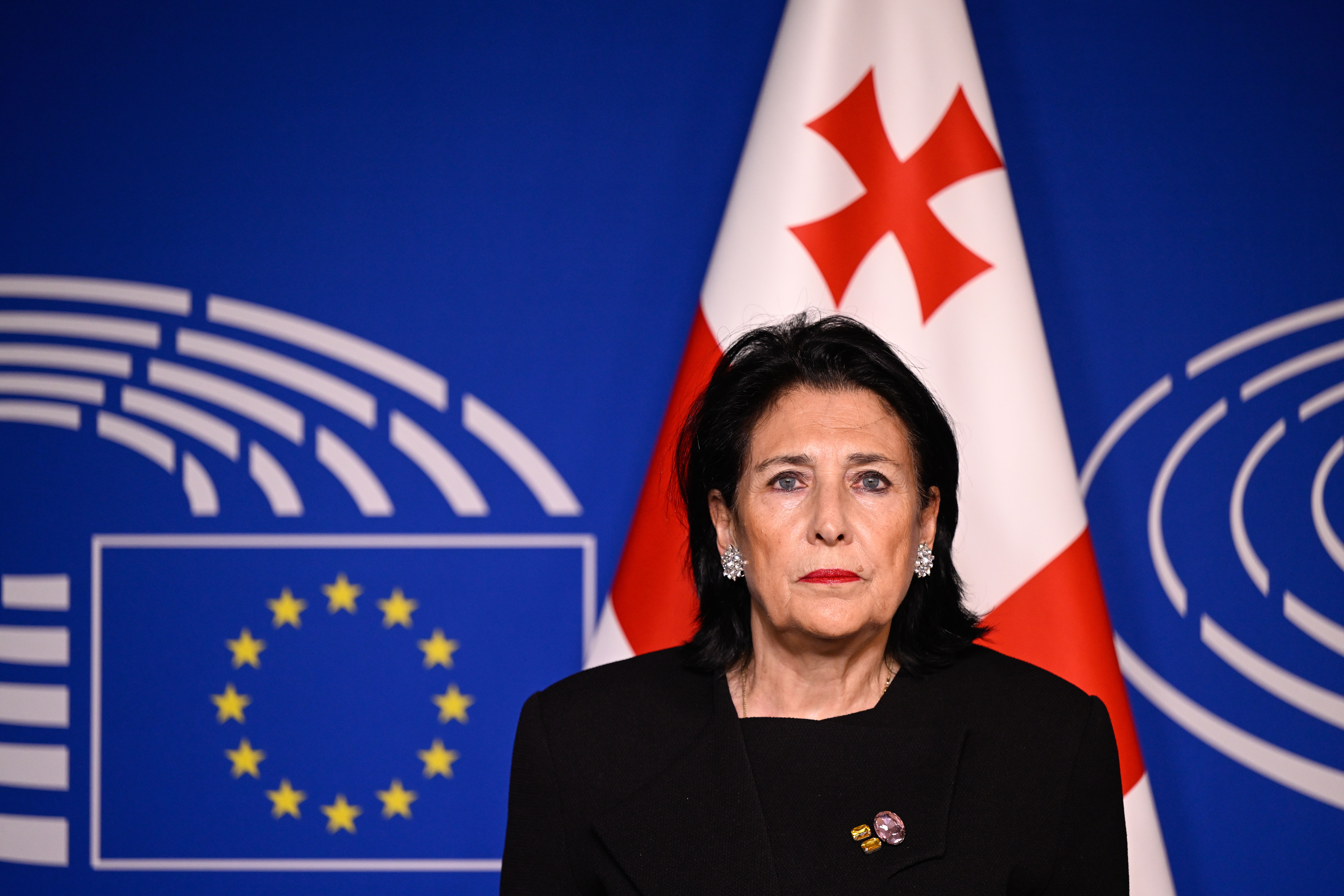
“Today, I want to say, as the only independent institution left in this state, that I do not recognize these elections,” Zourabichvili punctuated, explaining that recognizing them “is tantamount to recognizing Russia’s entry” and “Georgia’s subordination to Russia.” “We cannot allow anyone to take away Georgia’s European future,” she said, appealing to Georgians not to recognize the outcome of an irregular vote that effectively sanctions “a new form of occupation” by Moscow. The reference is to the de facto occupation of the separatist regions of Abkhazia and South Ossetia, which proclaimed independence in the 1990s and where Russian troops have been stationed since the 2008 war.
On the initiative of the head of state, the opposition front called a protest demonstration for tonight at 7 p.m. (4 p.m. Italian time). However, it is unclear how much participation it will garner. The observer heard by Eunews also that “Right now, the mood among ordinary people and activists is rather somber, and many are saying that they are not going to come out because they do not see what results it could achieve.”
“People are tired,” he explained, as they “spent most of the spring going to the square every night” to participate in protests to which law enforcement responded with tear gas and water cannons, “and now they feel exhausted and defeated.” However, it is not easy to predict what will happen starting tonight. If there is participation in the demonstration and tensions arise, a more widespread mobilization and new street clashes cannot be ruled out.
Reactions from the EU
In Brussels, reactions were mostly of condemnation of fraud, even though no EU community leader went so far as to define the elections as illegitimate. The High Representative for Foreign Policy, Josep Borrell, asked the relevant authorities “to fulfill their duty to swiftly, transparently, and independently investigate and adjudicate electoral irregularities and allegations thereof.” The president of the European Council, Charles Michel, announced that the situation in Georgia will be one of the topics on the agenda at the informal summit of the leaders of the 27 member states scheduled for Nov. 8 in Budapest. The European Parliament delegation, which was participating in the OECD mission, reported the “climate of hatred and intimidation” that “can seriously undermine the democratic process” in the country.
Bucking the trend, as usual, was Hungarian Prime Minister Viktor Orbán, who, while counting was continuing, congratulated Kobakhidze and the Georgian Dream “for their landslide victory.” The Hungarian premier also announced that he would visit Tbilisi in the evening to meet with his counterpart personally.
Congratulations to Prime Minister @PM_Kobakhidze and the Georgian Dream party on their overwhelming victory at the parliamentary elections today. The people of #Georgia know what is best for their country, and made their voice heard today!
– Viktor Orbán (@PM_ViktorOrban) October 26, 2024
However, for the European Commission, Orbán’s visit should be viewed “solely in the context of bilateral relations between Hungary and Georgia.” It cannot, in any way, be considered as an official visit on behalf of the EU. The doubt might arise considering that Budapest currently holds the shifting presidency of the Union and that the Hungarian leader has already created numerous diplomatic problems in recent months following his equally nonchalant meetings with Ukrainian President Volodymyr Zelensky, Russian President Vladimir Putin, Chinese leader Xi Jinping, and former U.S. President Donald Trump.
The uncertain future
The outcome of Saturday’s vote now poses a huge question mark over Georgia’s future. After the freezing of the EU integration process was frozen at the beginning of the summer following the Caucasian country’s adoption of repressive legislative measures (the most significant of which was the law on “foreign agents” and the one that infringed on the civil rights of the LGBTQ+ community), now the path of rapprochement to the European club is in danger of being halted for good.
If a new wave of protests were to begin, the party founded by oligarch Bidzina Ivanishvili would likely react in an authoritarian manner and attempt to suppress dissent by force, blaming any unrest on the inferences of the West. At the same time, the Georgian Dream should continue along its foreign policy trajectory, which threatens to bring the former Soviet republic back into Moscow’s orbit.
All this would only undermine perhaps irreparably Tbilisi’s relations with Brussels. One of the most immediate consequences could be revoking the visa liberalization scheme that the 27 member states introduced for Georgian citizens, which does not require unanimity and can, therefore, be implemented even with possible Hungarian opposition.
English version by the Translation Service of Withub